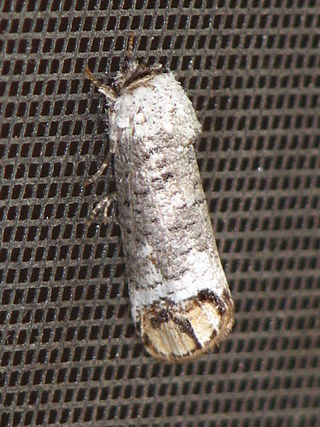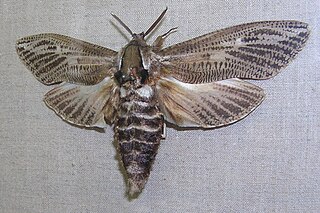
The Cossidae, the cossid millers or carpenter millers, make up a family of mostly large miller moths. This family contains over 110 genera with almost 700 known species, and many more species await description. Carpenter millers are nocturnal Lepidoptera found worldwide, except the Southeast Asian subfamily Ratardinae, which is mostly active during the day.

Endoxyla encalypti, the wattle goat moth, is an endangered giant moth of the family Cossidae. It is found in Australia, where it has been recorded along the eastern coast from Queensland through New South Wales and Victoria to Tasmania.

The Zeuzerinae are a subfamily of the family Cossidae.
Endoxyla acontucha is a species of moth of the family Cossidae. It is found in Australia and New Zealand.
Endoxyla affinis is a species of moth of the family Cossidae. It is found in Australia, where it has been recorded from Queensland and New South Wales.
Endoxyla amphiplecta is a species of moth of the family Cossidae. It is found in Australia, where it has been recorded from Queensland, New South Wales and Victoria.
Endoxyla eluta is a species of moth of the family Cossidae. It is found in Australia, where it has been recorded from Queensland.
Endoxyla edwardsi is a species of moth of the family Cossidae. It is found in Australia, where it has been recorded from Queensland and Victoria.

Endoxyla cinereus, the giant wood moth, is a moth in the family Cossidae. It is found in Australia and New Zealand. The species was first described in 1890. A rare contemporary sighting of the moth at a school in Australia garnered notice as an editor's pick among the daily headlines of the New York Times on May 8, 2021.
Endoxyla opposita is a moth in the family Cossidae. It is found in Australia, where it has been recorded from Queensland, Victoria and New South Wales.
Endoxyla donovani is a moth in the family Cossidae. It is found in Australia, where it has been recorded from Queensland, New South Wales and Victoria.
Endoxyla decorata is a moth in the family Cossidae first described by Charles Swinhoe in 1892. It is found in Australia, where it has been recorded from Western Australia.
Endoxyla euplecta is a moth in the family Cossidae. It is found in Australia, where it has been recorded from Western Australia.
Endoxyla interlucens is a moth in the family Cossidae. It is found in Australia, where it has been recorded from Queensland.
Endoxyla lichenea is a moth in the family Cossidae. It is found in Australia, where it has been recorded from Queensland.
Endoxyla magniguttata is a moth in the family Cossidae. It is found in Australia, where it has been recorded from New South Wales and Queensland.
Endoxyla polyploca is a moth in the family Cossidae. It is found in Australia, where it has been recorded from Queensland and Northern Australia.
Endoxyla reticulosa is a moth in the family Cossidae. It is found in Australia, where it has been recorded from Queensland.
Endoxyla vittata, the orange-lined wood moth, is a moth in the family Cossidae. It is found in Australia, where it has been recorded from Western Australia.




